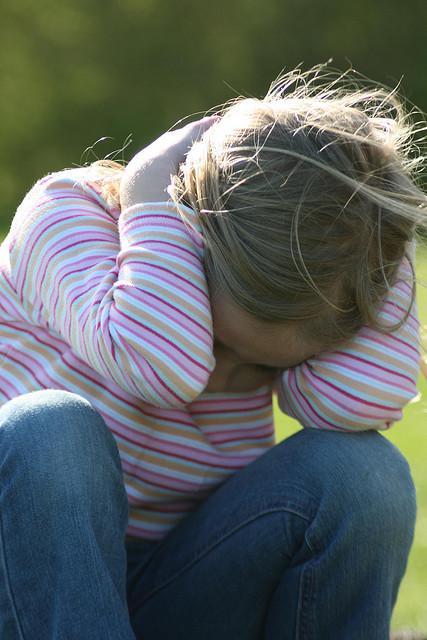Sadly, stress is not an issue or problem experienced solely by grown ups – children can feel stressed too. Last week, while I was away in Sydney at the DPCON13 conference, much of my head space was occupied with how Baby Girl was coping in my absence. She was prepared for me being away, but I anticipated she would have periods of time in those few days where some uncertainty and stress kicked in. When kids are stressed it’s important that the adults in their lives help by equipping them with some coping mechanisms.
But, wowsers, of course there are times when the adults feel stumped and unsure of what to do to help. I do hope then that these tips are useful for anyone assisting frazzled kids, as you can really help.

Recognise your child’s stress signals
Stress signals are very much dependent on the age of the child, as feelings of stress can manifest themselves in a range of signs and behaviours.
Toddlers, who are unable to clearly communicate their feelings, might regress to baby-like behaviors, such as using a nappy and/or bedwetting, chewing or sucking on fingers, or even biting others for attention.
Preschoolers when stressed may cry much more often than usual, appear nervous, behave wildly (like a mini tornado!)for attention and/or experience changes in their appetite or sleeping patterns.
Primary school aged children may have difficulty with their friendships, become shy and withdrawn, or be distrustful and oppositional.
Tweens and teens can present stress through poor and/or extreme behaviours, risk taking and challenging authority, deliberate isolation from others, anger, reporting the feelings of loneliness, worthlessness and low self esteem.
Accident proneness Hitting
Anger Kicking
Anxiety Insomnia
Appetite Loss Stuttering
Baby Talk Indigestion
Bed-wetting Thumb sucking
Biting Pounding Heart
Crying Spells Grinding Teeth
Detachment Fingernail Biting
Excessive Aggressiveness Respiratory Tract Illness
Excessive Laziness Tattling
This table shows some of the stress indicators that may be evident in children of varying ages, and is by no means a definitive or all-inclusive list. The original can be found here
So if your child is showing signs of stress, what do you do?
- Be available to them and listen
Although they may struggle putting feelings into words, kids often (but, not always) do want to talk about what’s bothering them. Being available to listen (actively) to your child is a very important way of helping them deal with stress and models great communication.
Sensing there may be an issue and asking your child directly if he/she is stressed might just get you the good ‘ol “eyeroll, sigh and nothing” response, but it’s certainly worth a crack. Use your instincts and observe changes to your child’s behavior – this is a form of listening, too and sometimes their feelings will b communicated to you non-verbally.
Golden tip: When communicating with your child about their stress, focus MORE on listening and much LESS on reacting.
- Teach them the words they need to use
Not only is it a hurdle for kids to recognize their feelings, finding the right words to describe these feelings is a second big challenge. Helping younger kids learn the appropriate words to identify and express their feelings may help ease the sense of overwhelming that stress brings with it. For older kids, gentle questioning and ongoing conversation around how to express feelings is a way they’ll learn to do have these difficult discussions more effectively.
- Remember to include your child in the solution-seeking to an age appropriate level
Your child is often more equipped to problem solve his or her way out of a stressful situation than you may realize. As you discuss the stressors that may be currently causing concern, remember to prompt for potential solutions and strategies as this is very empowering. Encourage him/her to believe in some of those strategies as a huge confidence builder.
- Please, what ever happens, don’t add to it!
It may seem like a statement of the bleeding obvious, but do be careful not to stress your child further by sharing all of your problems. Unless it’s regarding something that’s specifically relevant to his/her life AND is age appropriate a child does not need to know. Too much information becomes overwhelming to kids who tend to compound their own concerns with worries about their parents. A trusted friend, instead of your child, is a much more suitable confidante.
Hopefully, some of the above tips will help you to help your child cope with stress. Keep in mind, as difficult as the time is, that stress can be lessened and that communication is the key.
Can you tell if your kids are stressed? What do you do to help?
photo credit: foamcow via photopin cc
photo credit: Morton Fox via photopin cc

